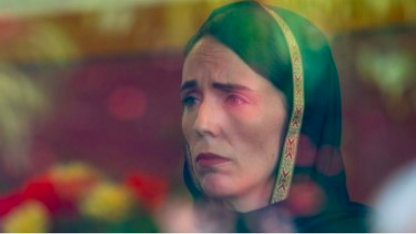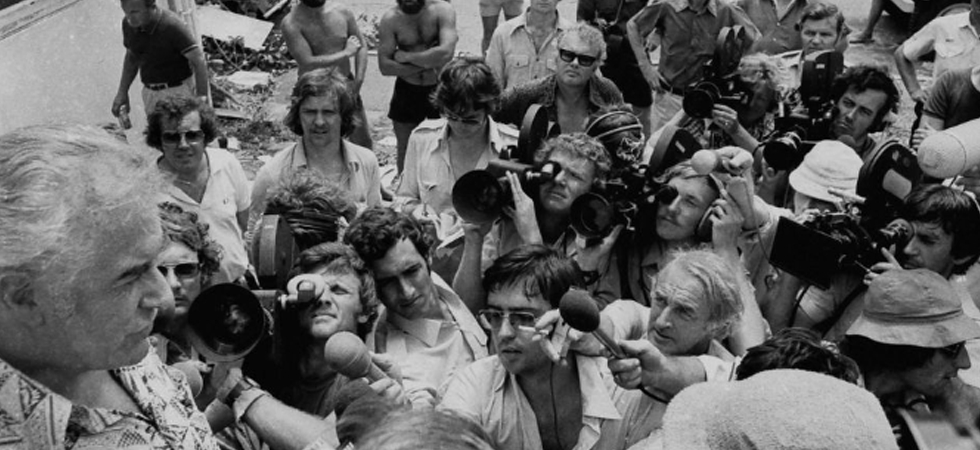Much has been made of our current Prime Minister’s absence from Australia during the ongoing and tragic bushfire crisis. And now of his less than heroic performance since his conscience/political nous got the better of him and he decided to come back and face the fire. Of course, he has been merely one of a number of politicians missing in action during the fires. Much has been made of the NSW Emergency Services Minister being in London during, well, an emergency. And not just any emergency. Now the NSW Opposition leader has tiptoed OS to escape the furnace. Are these people serious?
The old song went, “Santa never made it into Darwin”.
It was 1974, and as Bill and Boyd, those old Aussie crooners, sang it, Cyclone Tracy descended upon Darwin with deadly force. As seems often the case, disasters seem to occur around Christmas. Think 1998 and the Sydney to Hobart yacht race, chronicled so vividly by Rob Mundle, and 2004 when a tsunami struck Indonesia with even deadlier force, and staggering casualties. And finally, think 2019 the White Island volcano and the (mainly) New South Wales bushfires.
Holidaying “leaders” has become a theme of Australia’s fire ravaged summer. Along with the usual politicising of tragedy, the enlisting of current events as evidentiary support to one’s ideologies, and entering fully into blame games. It ain’t pretty.
Where the bloody hell was ScoMo? To quote Lara Bingle and to adapt the jingle created one of ScoMo’s former employers, the Australian Tourism Commission.
Across the Ditch, the infamously disaster-focused Prime Minister of New Zealand, Jacinda Adern, strangely, for her, kept initial distance from the recent Kiwi volcano eruption while it looked as though the eruption might be linked in some way to NZ regulatory incompetence. Since, of course, Adern has emerged into the full light of the TV cameras and has resumed normal empathetic transmission.
Back to 1974 and Cyclone Tracy, a political as well as a natural event. It was early Christmas morning in Darwin when the hurricane hit, hence the reference by Bill and Boyd to Santa.
Australia’s Prime Minister of the day, Edward Gough Whitlam, was, as it turned out later, notoriously, absent OS. The perception became embedded that Gough was paddling around the ruins of Athens and environs, then came home to the Darwin disaster, days later – then returned to his holiday! It became the template for how not to do national leadership during disasters.
There is, indeed, a bit of a history to the business of doing national leadership when the chips are down. Notoriously, that VicPol Royal Commission star witness of this past week and internationally recognised “leadership consultant”, Christine Nixon, was herself a victim of absent leader syndrome during Victoria’s horrendous Black Saturday bushfires of February 2009. President Bush 43 also felt the sharp end of national criticism during Hurricane Katrina. The political optics of national disasters are a real thing.
As the journalist David Nason (The Australian, 2010) has suggested:
The legend of Nero fiddling as Rome burned is often used as a metaphor to describe incompetent officials failing in times of crisis.
Nason also noted that Nero himself got a bum deal over the fiddling episode, and reported that former Justice Jim Spigelman, Gough’s press secretary at the time and travelling with him when Tracy struck, has relatively recently defended his old boss’s actions related to Darwin and Cyclone Tracy. On Spigelman’s account, perhaps Gough got a bum deal as well. He did return to his overseas trip after the initial disaster settled down into the recovery phase, but, unlike a certain, more recent successor who left for overseas during the fire emergency, Gough didn’t know that Tracy was coming, or at least he didn’t know how horrendous its impacts would be, when he headed overseas on what was, in fact, both a business trip and a holiday.
https://www.theaustralian.com.au/news/inquirer/the-art-of-managing-disasters/news-story/a53aa5c406b90e2af00d1e481e024a70
Expecting national leaders to be present during national emergencies has a number of dimensions. There is the expectation that they will be at least present and supportive, if not necessarily useful. This week we have had the spectacle of poor old Scott “book him Dano” Morrison lounging in Hawaii while his Labor opponent was serving sausages to exhausted and appreciative firies in Bargo and his predecessor but two Tony Abbott even more intimately involved with fighting the fires. The latest footage to emerge of Abbott, masked up, running heroically into burning properties has only strengthened ScoMo’s discomfort. Given the Prime Minister’s cack-handed performance since his return, one can only think it may have better if he had remained waxing the surfboard in Hawaii.

Then there are the political opportunities that come from these “man (or woman) of the people” photo opportunities associated with the comforting of victims during national and natural disasters. Here we get to see the human side of the politicians, and this can only help to endear them to voters. John Winston Howard truly mastered the art and probably still remains best-in-show. This is not to say that the involvement of leaders in these situations is necessarily cynical, just that it can have substantial political benefits.
There is a danger, though, that politicians becoming the public face of tragedy management might come to be seen by the electorate as self- serving. A case of going too far and backfiring. Jacinda Adern’s behaviour in the aftermath of the terrible 2019 tragedy in Christchurch came to be seen by her opponents as quite opportunistic, and her hugging of Muslim victims while wearing their garb, not her own, as very, very stage-managed. The emoting Jacinda “look” has become quite (in)famous in New Zealand. Others like Fraser Anning were criticised for politicising tragedy – by opining on its real causes – at the time of the Christchurch shootings, but why shouldn’t politicians immersing themselves in the optics of disasters equally be seen as essentially “political” behaviour? It is an instance of “conspicuous grieving” that serves political ends, brilliantly as it happens.

Some unkind observers wondered aloud when Jacinda was going to put on a nun’s habit and fly off to Colombo to comfort the poor victims of the Easter Christian church bombings, to so empathise with victims “on the other side”.
https://quadrant.org.au/opinion/qed/2019/04/conspicuous-grieving-and-the-politicisation-of-tragedy/
In view of Morrison’s savage treatment by locals in fire ravaged Cobargo (southern New South Wales) upon his return to the action, one might wonder at the wisdom of less-than-fully equipped leaders donning the mantle of JWH, the master of the art. Howard, as we know, was not universally popular, even during his pomp. Yet he managed to pull off the “father of the nation” role with aplomb, in contrast to those not so equipped with this particular gift. It was probably his utter genuineness that endeared him to the suffering victims of the disasters of his time.
Just like with many things that are now taken as read, it is uncertain when all this politicisation of disasters first occurred. And there are different leadership models in play as well.
I recall the former premier of Queensland and now defender of banks during these, for banks, difficult times, Anna Bligh, taking to the microphone during the Brisbane floods of 2011 and becoming, in effect, a weather girl and journalist-in-chief, with the ubiquitous hearing impairment interpreter gesticulating vigorously beside her during the many, many pressers that ensued. Increasingly looking exhausted, physically and emotionally, Bligh, quite simply, became THE face of the Brisbane floods. The sufferer-in-chief.
Whether all this activity was seen by Bligh’s minders as a pre-emptive strike against those who might later come to blame Bligh’s government for actually causing the disaster – through a then emerging obsession with climate change – or was merely a compassionate and concerned leader doing her bit, who would know? But it became the template for leaders to immerse themselves in operational disaster management, and be seen to be “in command” during a crisis. We cannot all be Churchill, but, like the fictional Jim Hacker, we will put on the voice and have our fifteen minutes.
The leader as hands-on disaster manager is one model. Howard, on the other hand, was more a man-of-the-people hugging the victims type of leader.
The Bligh play seems to have been one of the early examples of the disaster operational-manager-in-chief genre, if not the first. But the man-of-the-people genre is much older, I suspect.
Where does all of this leave poor old ScoMo, the returned-from-holidays and now bungling and unconfident prime minister? Perhaps, not seeming to have any policies, certainly not those that might please conservatives, Morrison and his inevitable minders felt the need to grow and maintain a “man of the people” image to go along with his (quite ill-deserved) “I’m with Donald and Boris” persona. Despite ScoMo’s best efforts and those of his media cheer squad, the latter, of course, is merely historical coincidence, based on three right-of-centre leaders who defied polls and electoral predictions to win power, or in Morrison’s case, “office”.
Of course, Trump, Johnson and Morrison did all have one circumstance in common – they had inept and ideologically driven opponents who gave voters the utter irrits, and so eased their passage into government. But it is one thing to glide into government against the odds, and with the material aid of a scary opponent. It is quite another to maintain the trust, respect and/or affection of the people.
The initial Monday morning quarter-backing on the absent ScoMo’s Hawaiian “blunder” focused on the potential electoral damage of his doing a Gough – even an apparent Gough – rather than on the opportunity cost of not doing a Jacinda. In recent days, the pundits have focused on the grim optics of Morrison’s disastrous visits to the fire zones and his initial relentless hiding behind states’ rights to explain away his own Government’s early inaction, only to be followed by a series of unlinked, late-in-the-day interventions that seem to have pleased no one, least of all those in the States with responsibilities relating to the fires who have been taken aback by Morrison’s own late charge into the furnace. Not quite the optics of a fully kitted out Abbott, just getting on with it and not seeking any reward for his efforts. Absence without leave, followed by inept policy on the run and awful images of unwanted affection at the coalface. This has been a rolling disaster for Morrison, and as we all remember from Gough’s Darwin adventure, whether or not the derision was or is deserved, that these things stick in the voters’ subconscious.
With ScoMo’s already precarious hold on the affections of genuine conservatives, and perhaps also those of the silent Australians too, he might just need all the political smarts he can now obtain.








